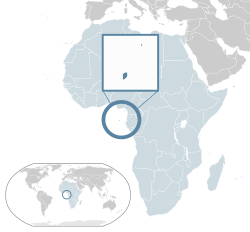LGBT rights in São Tomé and Príncipe
Lesbian, gay, bisexual, and transgender (LGBT) persons in São Tomé and Príncipe face legal challenges not experienced by non-LGBT residents. Both male and female same-sex sexual activity is legal in São Tomé and Príncipe, however LGBT persons face stigmatization among the broader population.
 | |
| Status | Legal since 2012 |
| Gender identity | No |
| Military | No |
| Discrimination protections | None |
| Family rights | |
| Recognition of relationships | No |
| Adoption | No |
São Tomé and Príncipe was one of the few African states that signed a "joint statement on ending acts of violence and related human rights violations based on sexual orientation and gender identity" at the United Nations, condemning violence and discrimination against LGBT people.
Laws regarding same-sex sexual activity
Under the Penal Code of São Tomé and Príncipe that took effect in November 2012, same-sex sexual activity is legal. The age of consent is 16 years regardless of sexual orientation or gender.[1][2]
Recognition of same-sex relationships
São Tomé and Príncipe does not recognize same-sex marriages, civil unions, or domestic partnerships.
Discrimination protections
There is no legal protection against discrimination based on sexual orientation or gender identity.
Public opinion
A 2016 poll found that 46% of Sāo Toméans would like or not mind having an LGBT neighbor.[3]
Summary table
| Same-sex sexual activity legal | |
| Equal age of consent | |
| Anti-discrimination laws in employment only | |
| Anti-discrimination laws in the provision of goods and services | |
| Anti-discrimination laws in all other areas (Incl. indirect discrimination, hate speech) | |
| Same-sex marriages | |
| Recognition of same-sex couples | |
| Step-child adoption by same-sex couples | |
| Joint adoption by same-sex couples | |
| Gays and lesbians allowed to serve openly in the military | |
| Right to change legal gender | |
| Access to IVF for lesbians | |
| Commercial surrogacy for gay male couples | |
| MSMs allowed to donate blood |
References
- "Código Penal: Aprovado pela Lei 6/2012" (PDF). Archived from the original (PDF) on 4 March 2016. Retrieved 20 May 2013.
- "telanon.info - This website is for sale! - telanon Resources and Information". www.telanon.info.
- "What are the best and worst countries to be gay in Africa?". Gay Star News. 1 March 2016. Retrieved 3 July 2019.